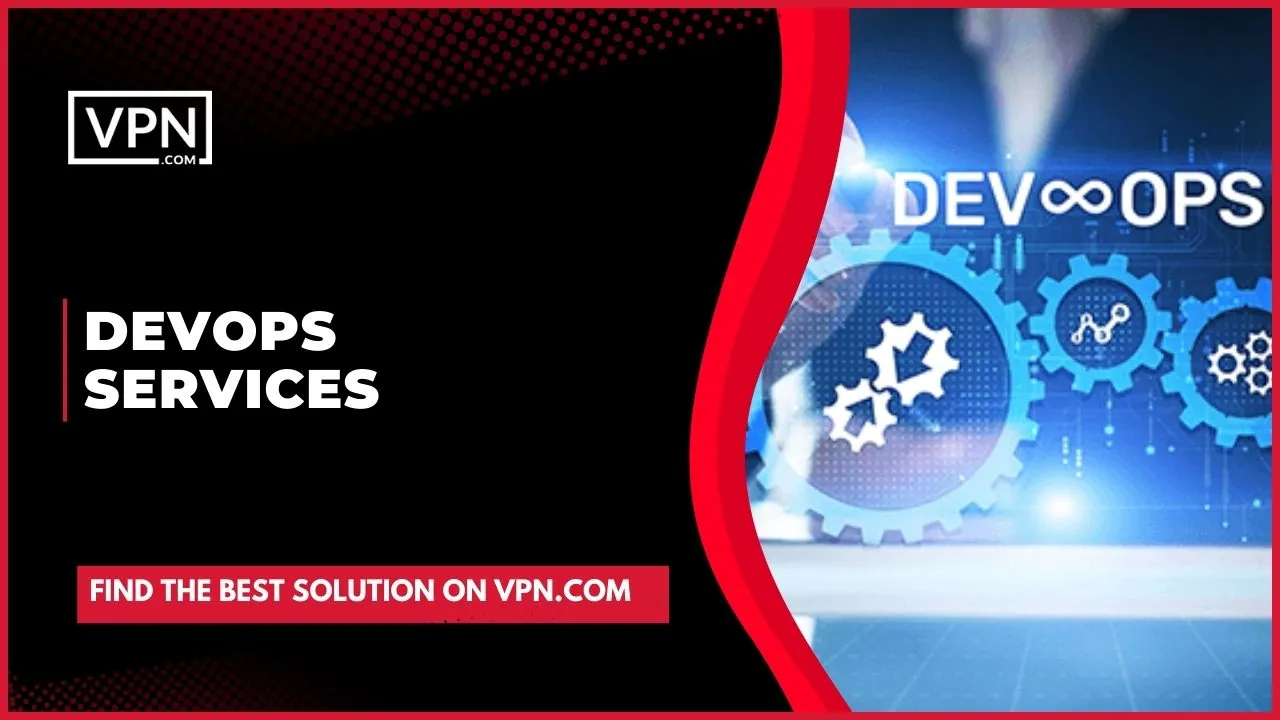DevOps Services

Companies have to give us software that works well and doesn’t slow us down, especially with all the new techs coming out. DevOps services are what make modern software development and delivery happen. DevOps teams work together to create software fast and consistently. Using this method makes the product better, gets it out faster, and makes it easier to keep making it even better. Their services are super important for software development and delivery, and that’s the reason why they’re used a lot.

Our #1 Rated Monitoring Service
- 24x7x365 multi-cloud security
- Security Assessment & Remeditation
- DevSecOps
- Cloud Disaster Recovery
What Are DevOps Services?
DevOps is a pretty awesome way of working where software peeps and IT folks join forces to make software delivery faster and better. There are a ton of DevOps services that can help make this happen. CI tools are super helpful for building, testing, and deploying code.
They help you avoid mistakes and get things done quicker. CD tools make it super easy to send code to production and make sure it’s all good by running tests and quality checks automatically. IaC tools make life easier for devs by letting them write scripts that automate the setup and config of infrastructure resources.
Common DevOps Services

Developers are using technologies to optimize their workflows as software development becomes more complex. CI and CD tools, which automated code testing and deployment, are crucial. Developers need infrastructure automation solutions to easily manage their apps’ infrastructure.
Monitoring and logging tools reveal application performance. Security technologies protect programs, while collaboration tools improve teamwork. These tools are important for modern software development teams to compete in today’s fast-paced tech industry.
Continuous Integration (CI) tools
DevOps relies on Continuous Integration (CI) for error-free software development. It involves routinely integrating and testing code updates to catch issues early in the development process. Developers can deliver dependable software faster by automating build, test, and deployment. Jenkins, CircleCI, and Travis CI offer code analysis, automated testing, and reporting.
CI in DevOps services reduces development timelines, improves product quality, and increases customer value. CI allows teams to rapidly improve and deliver high-quality software.
Continuous Delivery/Deployment (CD) tools
Continuous Delivery (CD) helps software development teams provide high-quality products to end-users quickly. It automates code building, testing, and deployment. CD improves teamwork, release cycles, and manual intervention. Docker, Kubernetes, Ansible, and other CD tools have made building and deploying apps easier for developers. CD automates software delivery to end-users, helping teams deploy high-quality software faster and more efficiently.
Infrastructure Automation tools
The process of managing infrastructure resources, such as servers, networks, and storage, programmatically by utilizing code is known as infrastructure as code (IAC). Teams can scale, optimize, and swiftly deploy infrastructure resources with the help of IAC’s automated solution rather than manually configuring each component and dealing with time-consuming maintenance issues.
Teams may manage infrastructure as code and reduce the risk of human mistake by using technologies like Terraform, CloudFormation, and Puppet. Teams can ensure their infrastructure is consistent and repeatable with IAC, which also makes it simpler to carry out testing and deployment operations in a continuous development pipeline.
Teams may establish a more effective and streamlined workflow and deliver software more quickly and effectively by including infrastructure automation into the broader DevOps services process.
Monitoring and Logging tools
Infrastructure as code (IAC) manages servers, networks, and storage using code. Rather than manually setting each component and dealing with time-consuming maintenance concerns, IAC offers an automated solution that enables teams to grow, optimize, and rapidly deploy infrastructure resources.
Teams can manage infrastructure as code with technologies like Terraform, CloudFormation, and Puppet, reducing the risk of human mistake. With IAC, organizations can ensure the consistency and reproducibility of their infrastructure while also making testing and deployment chores easier in a continuous development pipeline.
Teams may establish a more effective and streamlined workflow by integrating infrastructure automation into the broader DevOps process, making it easier to release software in a timely and efficient manner.
Collaboration Tools
DevOps strategies require collaboration to streamline processes and ensure teamwork. Slack, Jira, and Trello provide real-time collaboration, information sharing, and roadblock identification.
This facilitates the integration of work between teams and departments and encourages shared accountability. Collaboration creates a culture of communication and cooperation that helps DevOps teams work more efficiently and produce better goods and services.
Security Tools
In today’s fast-paced world of continuous delivery and integration, it’s no surprise that the integration of security in the DevOps process has become increasingly critical. Security tools play a crucial role in this integration, helping teams identify and mitigate vulnerabilities before they can cause havoc in their production environments.
Tools like Snyk, SonarQube, and Aqua Security have become immensely popular in the industry for their ability to secure code and containers, which is crucial for a well-functioning DevOps ecosystem. Integrating security into DevOps helps teams move fast while still guaranteeing that their applications meet the necessary security standards.
Ensuring that security is incorporated at each level of the DevOps process can greatly reduce the risk of security breaches and downtime while making the developers’ lives easier.

Our #1 Rated Monitoring Service
- 24x7x365 multi-cloud security
- Security Assessment & Remeditation
- DevSecOps
- Cloud Disaster Recovery
Continuous Integration tools
Continuous Delivery tools
Infrastructure Automation tools
Monitoring and Logging tools
Collaboration Tools
Security Tools
What Are The Benefits Of DevOps Services?

The benefits of DevOps services are faster time to market, improved collaboration, increased efficiency, improved quality, better security and improved customer satisfaction. Companies must keep ahead of the curve to compete in today’s fast-paced, ever-changing business landscape. Time to market is important.
Companies must introduce new goods and services more quickly than their rivals. This requires better teamwork. Teamwork speeds product development, reducing time-to-market. Efficiency, quality, and security improve. This improves client satisfaction, a company’s ultimate purpose. Companies can succeed long-term by focusing on these essential factors.
Faster Time-To-Market
DevOps services are a game-changer for tech companies trying to stay ahead. DevOps approaches streamline software development, testing, and deployment, speeding product delivery. This speeds up product development and helps companies adapt to customer needs and industry trends. Faster delivery times boost customer satisfaction, loyalty, revenue, and profitability. Many companies are switching to DevOps services because of its many benefits.
Improved Collaboration
Any firm must prioritize collaboration, and DevOps services are essential to making that happen. DevOps services optimize workflows and enable teams to collaborate more effectively by offering a seamless integration of development and operations.
Improved collaboration not only leads to quicker and more effective software delivery, but it may also improve communication, boost innovation, and promote an accountable and open culture.
Everyone wins when teams are given the freedom to collaborate effectively, from the developers who can concentrate on creating better software to the client who enjoys an improved user experience. Overall, there’s no doubt that DevOps services are an important tool for any company trying to boost collaboration and promote success.
Increased Efficiency
DevOps services are essential for optimizing the software development and delivery processes, speeding up and improving the reliability of system updates and deployment. DevOps services can work with businesses to develop a continuous improvement and automation culture.
Adopting DevOps methods helps speed up development cycles, increase responsiveness and agility, and enhance operational efficiency. This can result in improved teamwork, higher quality, higher customer happiness, and greater productivity as a whole.
Organizations who can produce faster, higher-quality software are likely to have an advantage over their rivals in a fiercely competitive commercial market. In order to stay competitive and provide top-notch client experiences, enterprises may gain a lot from increased software delivery efficiency provided by DevOps services.

Our #1 Rated Monitoring Service
- 24x7x365 multi-cloud security
- Security Assessment & Remeditation
- DevSecOps
- Cloud Disaster Recovery
Improved Quality
DevOps services have revolutionized production environments for companies. DevOps integrates development and operations teams to automate and standardize processes for faster, more reliable releases. Quality increases customer satisfaction and saves companies money.
Reducing downtime and errors by identifying and fixing issues faster can enhance productivity and profitability. With greater application performance data, companies may identify areas for improvement and take proactive efforts to fix them, creating a more resilient infrastructure. Given these benefits, DevOps is being used by more firms to lead digital transformation.
Better Security
Cybersecurity dangers are advancing quickly in today’s technology environment and are getting harder to foresee. DevOps services can assist organizations in strengthening their security posture and better defending themselves against attacks by placing an emphasis on collaboration, automation, and a more agile approach to software development and deployment.
DevOps teams can find vulnerabilities early in the process and stop them from going into production by conducting continuous security testing across the software development lifecycle. As a result, there may be significant cost savings as well as an increase in consumer confidence and brand reputation.
DevOps can also assist firms in better navigating regulatory compliance obligations and staying ahead of emerging dangers. All of these elements work together to make the organization as a whole more safe, enduring, and prosperous.
Improved Customer Satisfaction
DevOps services help boost client satisfaction. DevOps helps companies improve product quality, delivery, and customer service. These elements improve consumer experience, which boosts loyalty and retention.
Through feedback and data analysis, DevOps helps firms better understand consumer wants and preferences, allowing them to modify their services and products to match customer expectations. client happiness boosts income, client retention, and word-of-mouth marketing. To satisfy customers and thrive, firms must invest in DevOps services.
What Are Best Practices For Implementing DevOps Services?

The best practices for Devops services are adopting a Devops Culture, Prioritizing Automation, Investing in training, Emphasizing collaboration and focusing on continuous improvement.
Adopting a DevOps culture demands more than simply new technologies and processes. This shift prioritizes automation. Automation helps DevOps teams streamline repetitive operations and focus on business-value-generating activity. To automate workflows, firms must train and upskill their personnel.
DevOps teams must also encourage cross-functional collaboration and communication to break silos and align functions. Finally, DevOps teams must focus on continuous improvement to learn, iterate, and enhance delivery speed, quality, and reliability.
Adopting A DevOps Culture And Mindset
Communication, cooperation, and shared ownership define DevOps culture. This culture encourages teamwork and project ownership. Everyone should be encouraged to communicate and share their opinions. Everyone should collaborate and exchange knowledge for innovation and efficiency.
Netflix, Etsy, and Amazon have successful DevOps cultures where teams collaborate to launch new products and upgrades faster than their competitors. Companies may improve innovation, efficiency, and productivity by adopting DevOps.
Prioritizing Automation
DevOps’ success depends on automation since it streamlines operations and lowers mistake rates. Teams can concentrate on higher-value tasks like innovation and improvement rather than mundane maintenance by implementing automation. By removing manual processes and human error, automation can also save time and money.
Continuous integration and delivery, automated testing and deployment, and infrastructure provisioning are just a few examples of automated processes in DevOps. These procedures simplify the pipeline for delivering software while guaranteeing its dependability and quality. Overall, automation is crucial in the current fast-paced software development industry because it enables teams to produce high-quality products rapidly and effectively.

Our #1 Rated Monitoring Service
- 24x7x365 multi-cloud security
- Security Assessment & Remeditation
- DevSecOps
- Cloud Disaster Recovery
Investing In Training And Upskilling
In today’s fast-paced world, workers need training and upskilling to keep up with new technology and job needs. To stay ahead, DevOps practitioners must use the latest technologies and practices. Online courses, certification programs, and specialty workshops are readily available. Training enhances individual performance, organizational efficiency, and market competitiveness. Employers should prioritize training to improve employee retention and happiness, which boosts profits. Therefore, prioritize constant learning in your company.
Emphasizing Collaboration And Communication
DevOps relies on teamwork and communication. Effective communication helps DevOps teams accomplish continuous integration and delivery. Collaboration entails sharing knowledge, skills, and resources. Chat apps, online conferencing, and project management software help DevOps teams communicate.
In a collaborative and communicative workplace, team members know their jobs, communicate information, and achieve goals. Encourage discussion and criticism in this setting. DevOps teams can increase organization performance by creating quality software.
Focusing On Continuous Improvement
One key component of effective DevOps processes is continuous improvement. Teams run the risk of experiencing process stagnation and inefficiency without it. Post-incident reviews and retrospectives are important tools for implementing continuous improvement because they give teams the chance to consider what worked well and where more work needs to be done.
These procedures foster an atmosphere of openness and invite everyone to offer suggestions for enhancements. However, establishing a culture of continuous improvement within your team is just as important as the practices themselves.
Leadership is needed in order to inspire and empower everyone to take responsibility for their work and promote innovation. Teams that have a continuous improvement culture are better able to adjust to shifting conditions and eventually produce better results.
Challenges Of Implementing DevOps Services

The phenomena of cultural resistance has been noted in a number of industries, including technology and the arts. It draws attention to the difficulties that occur when people oppose or resist change as a result of deeply rooted cultural beliefs or habits. On the other side, a lack of knowledge and experience might impede development since it makes it difficult for people to adjust to novel circumstances or technologies.
Combining these problems with integration problems and security difficulties can result in a perfect storm of challenges that may seem insurmountable. Identifying and resolving them is the key to overcoming these barriers. This could entail informing individuals about the advantages of change, offering support and training to increase expertise, or putting in place security measures that help allay fears.
By addressing these problems head-on, we may build a more diverse and forward-thinking society in which challenges like cultural resistance, lack of knowledge, integration problems, and security concerns are recognized as possibilities for improvement.

Our #1 Rated Monitoring Service
- 24x7x365 multi-cloud security
- Security Assessment & Remeditation
- DevSecOps
- Cloud Disaster Recovery
Conclusion
Modern software development relies on DevOps. Organizations must use DevOps to deploy software faster and more efficiently in a competitive market. Software development teams can link their workflows with IT operations to increase deployment, collaboration, and business results through DevOps services.
DevOps is promising, and DevOps services will become much more important. DevOps workers will be in demand as more companies adopt agile and DevOps strategies. DevOps will need new methods, skills, and tools to manage and monitor complex software systems. Thus, DevOps services help companies achieve and maintain long-term success.




